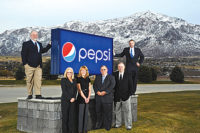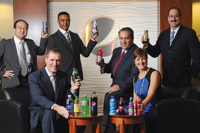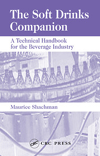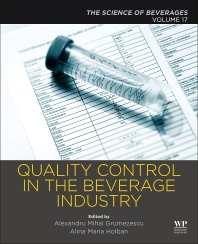Beverage Industry’s Bottler of the Year, Weinstein Beverage Co., Wenatchee, Wash., has continued to dominate the market it has maintained since the Pepsi franchise was founded in 1937. The family-owned company distributes Pepsi, Dr Pepper Snapple Group and Monster Energy beverages throughout a rural territory featuring many independent retailers. Weinstein Beverage’s focus on customer relationships has helped the company to achieve a market share between two-thirds to three-quarters in its territory, says Pat Weinstein, owner and chief executive officer of the company.
Weinstein Beverage services a territory located 150 miles east of Seattle that is approximately the size of Massachusetts, Connecticut and Rhode Island, Weinstein says. The company operates three branches in Wenatchee, Omak and Moses Lake to serve the territory’s population of 250,000. Each of the three branches has its own demographics: Wenatchee is the “big city” in the territory, Omak is “Western” with a sizeable Native American population and Moses Lake has a dominant Hispanic population, says Jeff Bryant, director of sales and marketing for Weinstein Beverage.
Despite the differences, Weinstein Beverage operates with one mantra, says former employee Ivan Jenkins, who is currently a member of the company’s board of directors and a consultant to the company.
“The philosophy we’ve had at Weinstein [Beverage] for many, many years is that we’re going to be the No. 1 vendor and supplier calling on each individual store, and we’re going to do whatever we need to do for that specific account,” Jenkins says. “Whether it’s a chain, independent or convenience store, we are your No. 1 partner - what do we need to do make you successful?”
In addition to the core of its business as a beverage distributor, Weinstein Beverage remains flexible with auxiliary businesses, including a vending company, wholesale goods distribution company, coffee kiosk service and supply, and a wine distributorship. The diversified interests provide the company with an opportunity to cater to various types of customers in its territory and provide an opportunity for future growth, Weinstein says. (For more, see the “Diversification in a changing industry” sidebar on page 30.)
Family dedication
In the 1930s, Pat’s father Max Weinstein owned a produce distribution company in Seattle that sold apples and pears harvested in the Wenatchee area. In 1937, Pepsi was looking to expand in the West and sought local franchisees who knew the territory surrounding Seattle. Max’s connections in Wenatchee provided him with a network and knowledge of the area, and as the story was later retold by Max, Pepsi made him an offer that he “immediately knew was a good deal,” Weinstein says.
“It was just a decision [my father] made,” Weinstein says. “He made me look totally flexible; he was stubborn – he made that decision and decided to go into it.”
The business was kept at a low boil during the Great Depression and World War II, Weinstein says. In 1951, Pepsi recommended industry veteran John Pashinski to help the stagnant franchise grow. During Pashinski’s 30 years as general manager of Weinstein Beverage, he was integral in shaping the company, Weinstein says.
“[Pashinski] basically made this franchise,” he says. “It was nothing. We still had a lot of distributors. We had warehouses scattered. We had three warehouses in different locations than they are today, but he put it together.”
While Pashinski ran the day-to-day operations of the business, Max was the head of the company. Neither Pat nor his brother David were working in the business at the time.
“My father never pushed us into the business in any way, shape or form,” Weinstein says. “I worked in the business in the summers two or three times. His big thing was getting an education, an absolutely top-flight education.”
When Max was in his 80’s, Pat’s brother David joined the business. After two years with Weinstein Beverage, David moved to the East Coast, leaving the continuation of Weinstein Beverage to his brother. At the time, Weinstein and his wife Susan Landon Weinstein owned a socio-economic and land use planning firm in the San Francisco Bay area.
In 1981, Pashinski helped choose his successor before retiring as general manager. Within the year, both Max and Pashinski had passed away. Despite major changes to the senior management, the company’s dedicated workforce helped during the transition, Weinstein says. Under Weinstein’s increasing participation and leadership, the company and its extensions more than tripled in size, he says.
In 1984, Weinstein Beverage purchased a 7-Up bottler in Spokane, Wash. In 1986, Weinstein Beverage added Bob Rust as general manager and he led the company until 2006. By 1996, weekly commutes to the Pacific Northwest convinced Weinstein and his family that they had to relocate from California, he says.
At the time, the soft drink distributor operated as two separate companies, the Pepsi franchise in Wenatchee and 7-Up Bottling Co. of Spokane and Coeur d’Alene, which became challenging, Weinstein says.
“Gradually what happened was it just became hard to have two separate companies,” he explains. “From the mid-‘90s to 2005, we did pretty well. We grew the [Wenatchee] business. We grew the Spokane business. We had a 20 to 25 share in Spokane - for a non-cola company, that was amazing. [In Wenatchee,] we had a 60 to 70 share, so we were in very good shape.”
Weinstein had bought his brother out of the company, which provided a financial burden on the company, he says, and in 2005 Weinstein Beverage sold 7-Up Bottling Co. of Spokane and Coeur d’Alene to what is now Dr Pepper Snapple Group. The sale provided Weinstein with an opportunity to survey the business in Wenatchee. Despite a boom in sales from 2005 to 2008, Weinstein knew the company’s growth could not be sustained.
Jenkins, who was the general manager of the Spokane bottler, returned to Wenatchee to help lead the management team as Weinstein determined the company’s future direction.
“That basically was stasis,” Weinstein says. “That was really not growth. That wasn’t moving the business forward, so I knew I needed an outside guy to bring everything in.”
Weinstein pursued Dan Crets, a 30-year veteran of the Pepsi system, who, at the time, was general manager for Ab-Tex, a Pepsi and Dr Pepper bottler based in Abilene, Texas. In 2009, Ab-Tex was purchased by Pepsi Bottling Group (PBG), but the purchase was prolonged as PBG was in turn purchased by PepsiCo. Crets agreed to join Weinstein Beverage that year, but the extension of the Ab-Tex purchase made him unavailable to transfer until March 2010.
In 2009, Weinstein Beverage also was building a new 60,000-square foot office and warehouse in Wenatchee.
“The warehouse is both a fact and a symbol of all that we’ve had to go through - it’s change,” Weinstein says. “We’re going to change the entire way we operate, we’ve begun that process because the facility here gives us so much flexibility, I mean true flexibility.”
The area’s economy had weathered the nationwide recession fairly well, but last year Weinstein Beverage was hit with an economic slowdown, Weinstein says. And in July 2010, a statewide tax on carbonated beverages applied a $0.02 tax to every 12-ounces of carbonated soft drinks. The tax was to be paid by the bottler and although it was repealed at the beginning of December following a popular vote, its passage affected the company’s volume this year, Weinstein says.
Renewed direction
With a new leadership team in place, Weinstein Beverage is turning its focus to its organization, Weinstein says.
“We are maximizing our operations,” he says. “We are going through re-routing. We are going through reorganization of the hours. We altered, or fixed, our pricing architecture. We’ve tried to be really rational about the packages and the SKUs, the things that we have to maintain for this business.”
In March, Crets joined Weinstein Beverage as the company’s general manager and chief operating officer. He initially took time to learn the business and its auxiliary companies and then began to reorganize the company’s personnel in May. Weinstein Beverage’s former General Manager Kurt Grossarth, became manager of vending and wholesale; Bryant is head of sales; Dave Fishborne, head of operations; and Steve Gerstmann, the company’s controller. Crets also refocused Weinstein Beverage’s sales team.
“I realigned the rest of the sales team to focus on managing the day-to-day beverage business,” Crets says. “It’s a pretty challenging time in terms of the economy and we had the excise tax that hit us, so we had these headwinds that were creating some concerns in terms of how do we maintain the beverage side, which is the majority of the business.
“We wanted to make sure we were providing products that the consumers want, which was really SKU rationalization as well as simultaneously making sure we had the right products for today,” Crets continues. “We also restructured the business in terms of, ‘Where do we allocate our resources?’ We want to make sure we have plenty of service for our largest customers without ignoring our smaller ones.”
Weinstein Beverage’s rural market includes six Wal-Mart Supercenters, but also many independent accounts. In its grocery market independently owned retailers rank third, Crets says. In the small format market, the area has mostly independent stores with some local chains, which provides Weinstein Beverage with an advantage, Crets says.
“There’s a common ground there - they’re independent, Weinstein Beverage is independent - so they’ve leveraged that as a strength in this market,” Crets says. “Their share is 60-plus, so they demand and receive that share dominance. It’s win-win.”
To better service its customers, Crets rescheduled Weinstein Beverage’s sales and merchandising staff to 10-hour days, four days a week. Employees are either scheduled Monday through Thursday, Tuesday through Friday, or Wednesday through Saturday to provide delivery and merchandising six days a week, he says. Although the work week is shortened, in some cases, customers are receiving more deliveries and Weinstein Beverage’s employees have the opportunity to merchandise throughout the week, he says.
The company also switched the focus of its drivers and pre-sale representatives to small format accounts, while Weinstein Beverage’s merchandising representatives and sales management team were organized to service larger customers, such as Wal-Mart and Safeway.
Within the accounts, representatives have been refocused on the company’s bigger brands: Pepsi, Diet Pepsi, Mountain Dew, Diet Dew and Dr Pepper. The company also highlights its flavored soft drinks, which appeal to a particular segment of its market, Crets says.
“We’re a highly Hispanic market so the flavored category is popular,” he says. “We make sure that we are promoting flavors. Sunkist, Squirt and A&W Root Beer do very, very well, as does Pepsi and Dew. So we’ve got a nice diverse portfolio in that regard.”
With a portfolio that includes Monster Energy Drinks, Snapple, Starbucks ready-to-drink coffee and SoBe Lifewater, the company distributes the leading brands in almost every beverage category, Jenkins says. Weinstein Beverage has been a distributor for the Monster brand for 15 years, Bryant says, and the energy drinks perform very well in its area. The company also distributes Starbucks ready-to-drink (RTD) coffees and has been a test market for Seattle’s Best RTD lattes.
“Having the Monster products, Snapple products, Pepsi products and Dr Pepper products, our portfolio is so powerful that we have something for everyone,” Bryant says. “Then with being locally owned and with relationships that have been built for years and years and years, it makes it a really fun place to be.”
The Weinstein Beverage team is looking forward to the addition of the Gatorade brand to its portfolio next year.
“[Direct store distribution] servicing versus the current relationship is going to sell a lot more product because we are going to touch nearly every bottle that goes through their store, one bottle at a time,” Jenkins says. “Whether we’re in there merchandising it once a week or twice a week or six days a week, they’ve not had that kind of service with their current suppliers and that’s what DSD is. We take care of the account, lock, stock and barrel.”
Locally minded
Weinstein Beverage’s focus on its local community is one that influences almost every aspect of its business. Crets, the company’s general manager, is a 30-year veteran of the Pepsi system and says Weinstein Beverage’s community orientation sets the company apart.
“Even down to local fountain accounts, they just drive to win in this market and in their entire marketplace,” Crets says. “It is really unique in the sense that they are highly recognized as a true partner in the community and that’s not common from where I’ve been.”
The company also focuses on its customers and Crets is one of many members of the team who visit customers daily.
“I do a lot of marketplace visits myself,” Crets says. “I spend as much time in the market as I can. I like to get with the team in the morning and then I try to go to Moses Lake or to Omak or [Wenatchee], I try to make sure that I stay visible in the market. It’s important for me to see first hand and for customers to see me as well.”
For Weinstein Beverage’s sales team, the company takes advantage of its local relationships and frequently develops local and regional custom promotions to help drive volume, Bryant says. The company recently ran a custom spa promotion giveaway with its independently owned accounts. Weinstein Beverage also joined Dr Pepper to give away a trip to the American Country Music Academy Awards, which was one of many programs that are supported heavily by local media, he says.
The prevalence of independents in its market and strength of the relationships between Weinstein Beverage’s employees and its customers provides the company with the opportunity to be flexible and create new programs easily.
“Our salemen have the same attitude as the management,” Bryant says. “Every day it’s very important that the relationships are there that they are servicing our customers to the fullest. It goes back to our local marketing. Every day they start and they actually will come to me with ideas and say, ‘I’ve got this account and would like to do this,’ and so those relationships are so strong.”
The partnerships also extend beyond business, as sales representatives hunt, fish, and barbeque with their customers, Jenkins says.
In addition to partnerships with independent retailers, Weinstein Beverage created a program with Wal-Mart stores in the area to benefit local food banks, Bryant says.
Weinstein Beverage also is active in the local community as a charitable donor. The company supports local sports teams and is a sponsor of Wenatchee’s annual Apple Blossom Festival. It also supports Wenatchee Valley Community College and pioneered a scholarship program with Big Bend Community College in Moses Lake. The Weinstein Scholarship Fund program was designed in conjunction with the college’s financial aid office by Landon Weinstein and provides incident-based funds for students.
“The average person who goes to a junior college in this state is a woman, 28 years old, single with one or two kids,” Weinstein says. “At Big Bend, 35 to 40 percent of them are Hispanic. We put in place a Weinstein Scholarship Fund which basically is for if you run out of gas money and you need the $50 to put gas in your tank so you can drive to school and take the entrance exam, or you don’t have money for the entrance exam, here’s the $50 you need to do that, or you can’t pay the babysitter, we’ll do that.”
The program has grown at the college and, in some cases, enabled students to enroll who might not have been able to without the basic funds, Weinstein says. Once enrolled, the students become eligible for scholarships and grants. The company’s fund also provides full-scale funding for a few students and Weinstein Beverage hired a former student who benefited from the scholarship, he says.
Overall, the partnerships in the local area benefit all parties, Bryant says.
“It’s so important in our business and it has really built brand and customer loyalty,” he says. “People know they can come to Pepsi for support and if they have a great idea or a great cause we’ll do everything within our means to support them.” BI
Sidebar: Diversification in a changing industry
Weinstein Beverage, Wenatchee, Wash., established its first auxiliary business in the 1990s when it opened its vending company, Eastern Cascades Vending. Since then, the company has added a wholesale goods business, a coffee kiosk supply and service, and in 2009, a wine distribution company. Pat Weinstein, president and chief executive officer of Weinstein Beverage, sees the businesses as integral to the company’s ability to grow in its territory.
“Basically, we have a market share of two-thirds to three-quarters depending on the area we’re talking about,” Weinstein says. “How are you going to get growth if we aggregate the consistent growth we’ve had for all these years, when you’re basically at your max? There’s nothing you can do. That’s been part of what the last three, four, five years have been, is how do you diversify and how do you manage for that diversification?”
Eastern Cascades Vending is the largest of the businesses, but is only 10 percent of its soft drink business, Weinstein says. The vending business also offers coffee kiosk supply and service to accounts in the area. The subsidiary has been affected by economic fluctuation, but has been stabilized by its franchise agreement with Canteen Vending Co., Charlotte, N.C. The vending business allows the company with an entry into a variety of locations within its territory, he says.
“It is a major tool for us to get into various places of employment and schools here, which adds to our presence,” Weinstein says. “Everyone knows Pepsi, and everyone knows Weinstein in this region. We are everywhere.”
The company recently introduced a new software package to monitor the efficiency and efficacy of the vending business. The company also plans to introduce its 10-hour days, four days a week schedules to the employees in the vending business, says Dan Crets, general manager and chief operating officer of Weinstein Beverage.
Crets also is examining the auxiliary businesses to identify the most efficient way to use staff and resources. For example, some of the vending delivery drivers also were delivering goods from Weinstein Beverage’s wholesale goods company, which provides cleaning supplies and other bulk supplies. Crets is re-evaluating the process of deliveries to ensure they are made most efficiently.
The company’s wholesale business has experienced 300 to 400 percent growth recently, Crets says. Schools in the area frequently order janitorial supplies through Weinstein Beverage’s wholesale business, which provides the company with an entry into the market that has been challenged with industry-wide regulations on sugar-sweetened beverages in schools, Crets says.
The prominence of locally owned independent retailers also benefits Weinstein Beverage’s sales staff who can leverage the company’s family ownership and strong relationships to add services from its auxiliary companies, Crets says.
“I think that helps them insulate themselves with those customers and they leverage that to get coffee in there and wholesale products in there and, in some regards, the wine,” he says.
In September 2009, the company’s Wein & Stein LLC subsidiary received its wine license. Wein & Stein delivers wine to local retail and restaurant locations.
Weinstein Beverage is not restricted by territory agreements when considering expansion of the auxiliary businesses, Crets says. Since joining Weinstein Beverage in March, Crets has been monitoring the performance of the side businesses and is careful to ensure that expansion opportunities are identified in a disciplined manner.
“Unlike beverages, our franchise lines aren’t as tight, so you can expand when you can, not expand because you feel like it,” he says. “I’m a little bit more diligent around, what are our expansion opportunities? Do we capitalize on them and when? I aim to plan it versus just because we can.” BI
Related article:
Plant Focus: Weinstein Beverage Co. takes advantage of efficient design
Get our new eMagazine delivered to your inbox every month.
Stay in the know on the latest beverage industry marketplace trends.
SUBSCRIBE TODAY!Copyright ©2024. All Rights Reserved BNP Media.
Design, CMS, Hosting & Web Development :: ePublishing




